Terri Sewell honors Black History Month
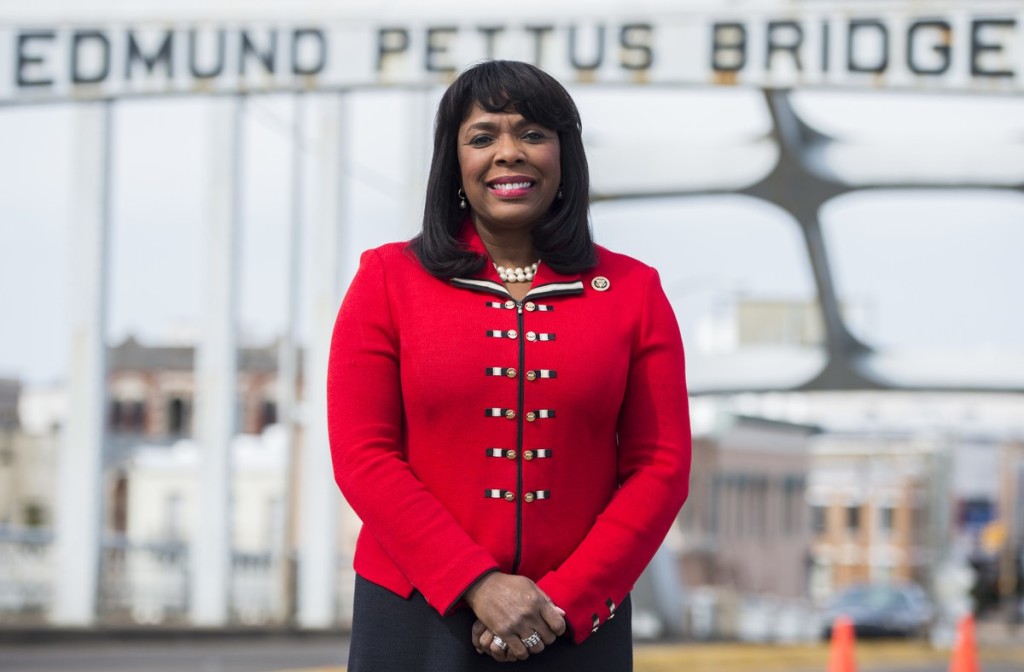
Feb. 1 marks the first day of Black History Month, and Alabama U.S. Rep. Terri Sewell (AL-07) is calling for a continued fight for equality. “Our nation has made much progress since the passage of the landmark Civil Rights Act of 1964 and the Voting Rights Act of 1965,” Sewell said. “We owe it to ourselves, our children, and those who came before us to continue to break down any barriers that divide our society and in its place build new foundations for understanding and reconciliation.” Originally established as a weeklong celebration by Dr. Carter Woodson in 1926, former President Gerald R. Ford expanded Black History Month into an month-long opportunity to celebrate the immeasurable contributions of African Americans – from science and technology to education to business to politics and beyond — in our society. “This month, we pause to remember and honor the sacrifices the Foot Soldiers of the Civil and Voting Rights movements made in order to make our nation a more equal, just, and fair society,” Sewell continued. “The story of Alabama and the 7th Congressional District cannot be told without remembering those who sought to free our land from racial animosity and discrimination.” “In keeping with the theme for the 2016 Black History Month is ‘Hallowed Grounds: Sites for African-American Memories,’ my office has been working with local, state, and federal officials to discuss how to best protect and preserve the historic Civil Rights sites across Alabama’s 7th Congressional District. Our district is the birthplace of the fight for equality, and we owe it to future generations to preserve this rich legacy. “We should all commemorate this month by fulfilling the promise of our nation’s democracy, and committing ourselves to uplifting our communities. By standing as one people, one nation, we can bring about change.”
Education commission recommends additional $107 million for state colleges, universities
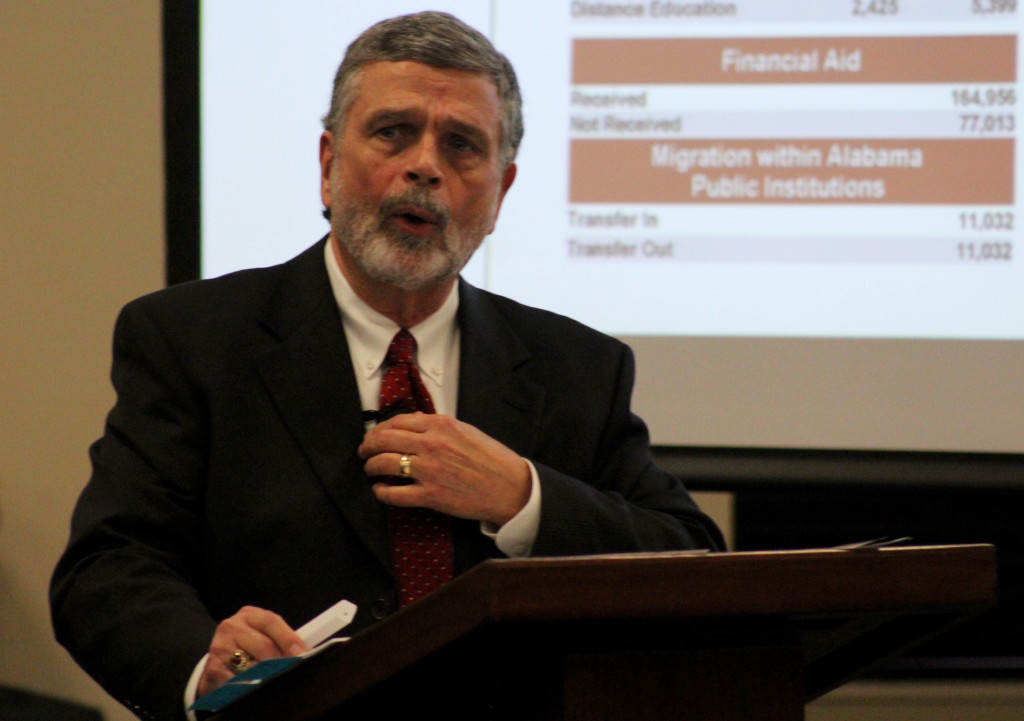
Gregory G. Fitch, executive director for the Alabama Commission on Higher Education (ACHE), appeared before the state House Ways and Means Committee and the Senate Finance and Taxation Committee on Monday to make the case for additional funding for Alabama’s two-year and four-year colleges. Before Fitch addressed the committees, legislators discussed bringing education committees together during the session to discuss ongoing concerns surrounding Alabama’s various education programs and the funding required for each. An idea being tossed around was the consideration of performance-based funding for higher education, as has been done in other states. Currently, only 51 percent of Alabama public school students are attending four-year universities and, of those, 32 percent need remedial courses in english, math or both. Fitch briefly touched on the economic impact of student loans for housing and other necessities outside of tuition, which go into local economies: In fall 2013, students received more than $800 million in grants and scholarships, more than $300 million in Pell grants and more than $500 million in student loans, funneling about $1 billion into state coffers. While most of Fitch’s address discussed the job of ACHE and various benchmarks that Alabama students are and are not meeting, a document presented during the hearing laid bare the committees budget needs. According to that document, Alabama’s public universities are requesting an increase of more than 31 percent from the Executive Budget Office, which rounds out to just about $480 million. That same document places ACHE’s recommended increase at just 7.19 percent, or more than $107 million. Of that, more than $20 million would go to two-year institutions and more than $93 million would go to other public institutions. With the recommended 7 percent increase across the board, all of the Alabama universities listed in the document will receive less than requested. Among those are Alabama State University, which requested the largest increase at 75.47 percent, and Troy University, which requested a 38.7 percent increase. Alabama’s largest universities, the University of Alabama and Auburn University, requested increases of 34.34 percent and 37.44 percent, respectively.
Get to know Jonathan McConnell, Richard Shelby’s most outspoken opponent
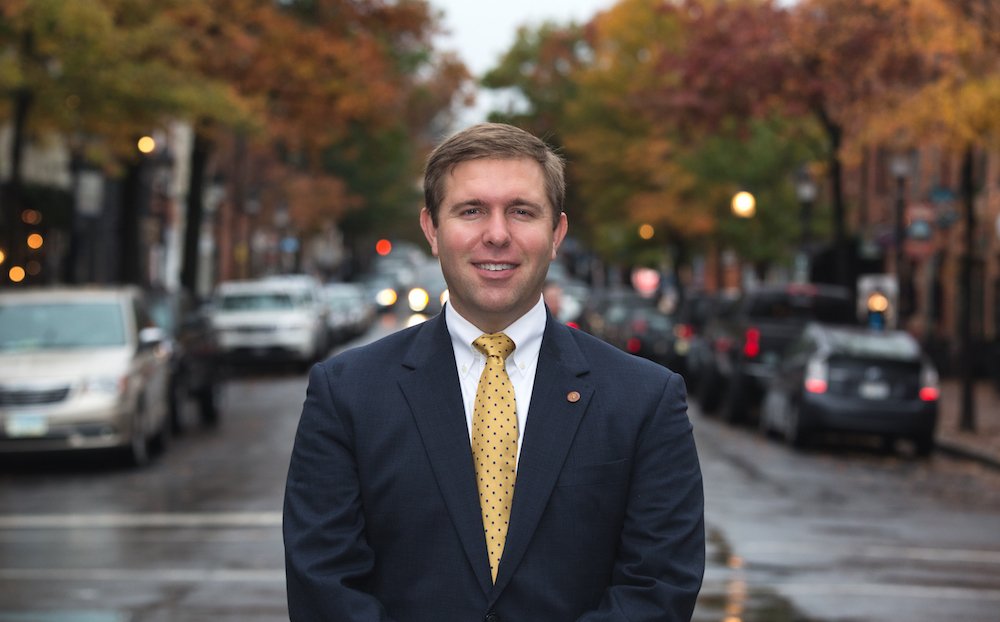
In the current battle for the Senate seat of Sen. Richard Shelby, no candidate has garnered the state’s attention like Republican Jonathan McConnell. A Mobile native, McConnell received his Bachelor’s Degree from Auburn University before joining the United States Marine Corps, where he served as an Infantry Officer and completed tours in Iraq and on the Syrian border. While pursuing his law degree from the University of Alabama, McConnell was inspired by the hijacking of Maersk Alabama by Somali pirates to form a private security company designed to defend ships in high-risk waters. According to McConnell, his company Meridian Global Consulting, LLC is currently defending ships in Somalia, the Persian Gulf and “all over the world.” “I didn’t want to get into politics,” McConnell said. “But this country is headed in the wrong direction.” McConnell, as a business owner and former Marine, sees keenly the need for the United States to balance its budget and do more to protect against the threat of terrorism, at home and abroad. Like the majority of the candidates running for Shelby’s long-time seat, the economy tops McConnell’s list of priorities. “I don’t see anybody stepping up to do anything about it,” McConnell said. “We’ve got to get America back on track and that means fixing our economy.” According to do McConnell, the most effective ways to address our current overspending and create revenue is to support tac reform, specifically the institution of a flat tax or fair tax and to cut regulations on small business. Further, McConnell believes that by eliminating the Affordable Care Act (ACA), also known as “Obamacare,” which he says has “killed the middle class,” small business owners would be relieved of a huge and unnecessary burden. McConnell also believes more should be done to fights terrorism and protect our own borders, two bullet points that he believes are one in the same. “We’ve got to stop rewarding bad behavior by incentivizing people to come over here illegally,” McConnell said. “First and foremost, we’ve got to secure our borders. There is not other first-world country in the world that’s going to allow people to cross their borders unchecked.” While these two issues top most of McConnell’s agenda, the Republican candidate noted that Shelby has failed to represent “Alabama values” through his approval of liberal Supreme Court Justices Ruth Bader Ginsburg, Anthony Kennedy and Stephen Bryer, a vote McConnell says undermines the conservative values of Alabamians. “I am 100 percent pro-life, I believe marriage is between a man and a woman and Obamacare has been one of the worst economic policies in the history of this country,” McConnell said. “Sen. Shelby has been a silent partner in undermining Alabama values.” While the candidate wouldn’t open up about endorsements from state legislators, an announcement he says will be released soon, he has gained the endorsement of Citizens’ United, a conservative political action committee (PAC), and Special Operations Speaks, a PAC supporting candidates best representing veterans. And while Shelby’s war chest is immense, McConnell believes it will take more than money to win this election. “I don’t have to compete dollar for dollar with him,” McConnell said. “The establishment has the money in this race, but the people have the power and people are sick of Richard Shelby, all across Alabama. I don’t think money can win this election.” Oddly, McConnell is looking forward to the possibility of a run-off, noting that if Shelby receives less than 50 percent of the vote it will only reinforce the assertion that his campaign is weak and people are ready for change. “It’s our entire system that’s broken,” McConnell said. “I can’t think of a single thing the federal government does well, except spend money. We need change agents in Washington, D.C.” — This part is part of our ongoing “Get to know” series spotlighting the various candidates in the 2016 Senate race. Click here to get to know the other candidates we’ve highlighted thus far.
Jeb Bush doing whatever it takes to stay relevant

Jeb Bush‘s supporters have spent $15 million on slickly produced ads to win over Iowa voters. Barely registering in the polls and increasingly desperate in the shadow of the Iowa caucuses, he’s now trying a cost-free, personal tactic: hugs. When 67-year-old Harrison Cass, Jr., of Waterloo, pledged to caucus for Bush Monday night, the former Florida governor jogged across a crowded town hall-style meeting to embrace him. “I give out hugs,” Bush said at the Cedar Falls event. “I’m from Miami, that’s what we do.” Bush, once considered the Republican presidential front-runner, is doing whatever it takes to stay relevant in the 2016 contest. And whether it’s a friendly squeeze or a scathing attacks ad from his allies, he’s showing no signs of going quietly. That’s despite the wishes of some Republican strategists, who fear his underdog candidacy is making it harder for his party’s mainstream wing to coalesce behind another candidate. All the while, billionaire businessman Donald Trump has maintained a huge lead over the so-called establishment candidates. Bush’s super PAC, Right to Rise, has disgorged tens of millions of dollars attacking the candidates seen to be in direct competition with him: Florida Sen. Marco Rubio, Ohio Gov. John Kasich and New Jersey Gov. Chris Christie. Right to Rise has spent more than $24 million on ads contrasting the former Florida governor with one or more of those three, most often Rubio, data from advertising tracker Kantar Media’s CMAG show. That’s on top of a tidal wave of millions of dollars of mail to voters in Iowa and New Hampshire opposing Rubio, Kasich and Christie — sometimes all three at once, expenses documented in Federal Election Commission reports. Overall, Bush’s allied super PAC had spent more than $80 million on television and radio advertising this campaign season as of midday Sunday. That includes more than $15 million in Iowa alone — which is about as much as the total by super PACs aligned with the other Republican candidates still in the race. Bush’s team privately jokes they’ve successfully lowered expectations headed into Monday contest by having scored just 2 percent in the Des Moines Register’s weekend poll. “Talk to me on Tuesday,” Bush said when asked about his precarious political standing during a brief interview with The Associated Press, referencing the day after Iowa’s caucuses. He also told Rubio supporters to stop “whining” about attack ads. “You don’t think that the Republican nominee is gonna get the bark scraped off him by the Clinton machine? This is minor league baseball, man,” Bush told AP. “If you can’t handle that, then how you gonna deal with a unified Democratic Party that will go out to try to destroy you? And be president of the United States?” he said. “This is a tough job. This isn’t bean bag. Everybody’s gotta get a grip.” Of Right to Rise’s 22 different commercials on broadcast television, none has played more frequently than a vicious spot hammering Rubio as inconsistent, CMAG data show. That commercial, depicting Rubio as a weather vane atop a house blowing around to point to different positions the super PAC says he has taken, had been on TV some 2,791 times as of early this week. Another of the super PAC’s most-broadcast spots is a cutting portrayal of Rubio as just as unqualified for the White House as Trump and Ted Cruz, the conservative Texas senator who has been near the top of many Iowa polls. The commercial begins by reminding viewers that the president must protect the country from attacks. One by one, the images of Trump, then Cruz, then Rubio are traced behind a desk in the Oval Office as a narrator asks, “Will he be impulsive and reckless, like Donald Trump? Will he have voted to dramatically weaken counterterrorism surveillance, like Ted Cruz? Will he have skipped crucial national security hearings and votes just to campaign, like Marco Rubio?” “The gross piling on against Marco by Right to Rise does not feel strategic, it feels personal and vindictive,” said Katie Packer, a Republican strategist who favors Rubio and is now leading a campaign to weaken Trump. “There’s no fundamental flaw other than who he is,” Packer said of Bush, suggesting that voters simply never warmed to the idea of a third Bush presidency. “The best marketing campaign in the world can’t sell a product that people aren’t interested in considering.” Bush is spending the Iowa campaign’s final hours campaigning alongside his son, Jeb Bush Jr., who set a low bar for success during a campaign appearance in Hiawatha Sunday afternoon. “It’d be great to be the best governor to out of here and beat expectations, whatever those are,” the younger Bush said when asked about his expectations. Meanwhile, Harrison said Bush was the first presidential candidate he ever physically embraced. Bush’s public display of affection caught him off guard. “I thought he was going to shake my hand,” Harrison said. “He’s really trying to reach out to people.” Republished with permission of the Associated Press.
Secretary of State John Merrill announces electronic voter registration platform
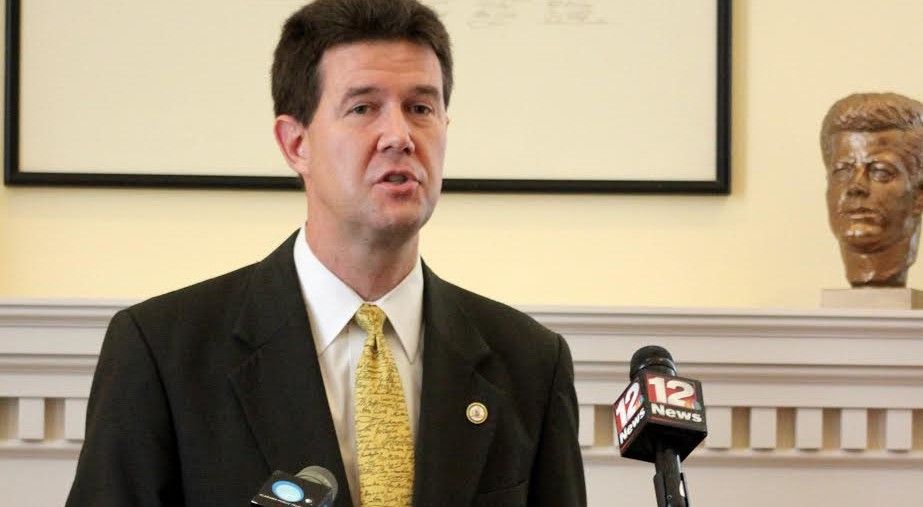
Alabama Secretary of State John Merrill said Monday that the state’s new online voter registration platform went live Jan. 22 and has been used by more than 7,500 residents. The online platform wasn’t unveiled until Monday’s news conference to allow officials to check the website is functioning properly. More than 140 people registered to vote on the website’s first day in action and more than 1,000 had registered between midnight Sunday and 10:30 a.m. Monday. “One of the most fundamental rights we as Americans are afforded is our right to vote,” Merrill said in a news release. “It is incumbent upon us as election officials to leverage technology wherever we can to facilitate the voting process. We want every eligible Alabamian to be afforded the right to vote, as well as participate in the electoral process, and the new implementation of Electronic Voter Registration will allow them to do so.” Through the Secretary of State’s website, residents can now register to vote for the first time or update their voter registration information within minutes. The new registration platform was designed to be simple and verifies all relevant information before passing the prospective voter’s information to county registrars, where it is double-checked before being approved. Merrill noted the new system is designed to “make it easy to vote and real hard to cheat.” Alabama joins 31 other states and the District of Columbia in now offering digital voter registration. “This is certainly a historic day in Alabama, and as long as I have the privilege to serve our citizens as their Secretary of State, I will do everything within my power to ensure all eligible Alabamians are able to exercise their right to vote,” Merrill said. The last day to register for the March 1 primary via electronic registration is Feb. 15.
Manufacture Alabama endorses Twinkle Cavanaugh for PSC president

The powerful pro-business consortium Manufacture Alabama has endorsed Twinkle Andress Cavanaugh for re-election to the presidency of the state Public Service Commission. The group cited Cavanaugh’s conservative “business-minded” approach to regulations and said her leadership on the commission helped protect the pocketbooks of Alabamians. “Throughout her tenure at the PSC, Twinkle has protected ratepayers by standing up to environmental extremists and the federal government’s mounting EPA regulations,” said Manufacture Alabama President George Clark. “Her business-minded leadership at the PSC is vital to our state and our state’s industry — because when the price of energy rises, the impact is felt not only by residential and industrial ratepayers but also by our state’s business climate. Competitive and reliable energy is necessary to drive business.” Cavanaugh, a Republican, responded in kind to the group’s endorsement. She expressed a shared commitment to promoting economic growth through a conservative regulatory style. “During these difficult times, the most important issues for Alabama families are jobs, jobs, jobs. Growing manufacturing jobs in our state is critical to putting mamas and daddies back to work,” said Cavanaugh. “If re-elected, I will continue to fight the liberal EPA and rogue environmental interests in their efforts to raise energy costs and burden employers with mandates that jeopardize our ability to retain and attract good-paying jobs for Alabamians,” continued Cavanaugh. Cavanaugh joined the commission in 2010 and was re-elected in 2012 after a narrow loss to Democrat Lucy Baxley in 2008. The PSC regulates and approves rates for the state’s energy utilities. Cavanaugh so far faces a challenge from former commissioner Terry Dunn, who joined the race just before the qualifying deadline in November. Dunn originally filed for the race in August, but then dropped out in October citing concerns that the utilities would spend “a lot of money” to defeat his bid to return to the commission. Before joining the commission, Cavanaugh served as the state Republican Party’s first female executive director and an adviser to former Gov. Bob Riley.
State Democratic Chairwoman Nancy Worley optimistic of turning Alabama blue

Nancy Worley, chairwoman of the Alabama Democratic Party, knows her party has an uphill battle in winning elections in one of the reddest states in the nation. “We would love to see all of the Republicans replaced with Democrats,” Worley said. “Realistically, that won’t happen but, hopefully, we can turn this state from red, to purple, to blue.” While most state and local elections see an influx of voters during presidential elections, Worley says the biggest boon for Democrats is Republicans. “I think the Republican Party is helping us change people’s minds as much as we help ourselves through some of their terrible legislation,” Worley said. “Because their interests lie with the big money, corporate donors that give to the Republican Party. Their interests don’t lie with working people and families.” Worley said Alabama voters will “eventually wake up and start voting with their heads, instead of their hearts,” contending that Republican voters often vote with their hearts, and support the fight against President Barack Obama, Washington, or “some really erroneous idea that you can build a wall around countries.” Worley added that Vermont Sen. Bernie Sanders‘ recent surge in the presidential race is inspiring young voters in much the same way Obama did in 2008. Chief among Worley and her party’s concerns are the economy, health care and education. “The economy is the No. 1 issue,” Worley said. “The economy is always the No. 1 issue because it drives people’s lives and how they function. Democrats have a really good record on that over the past eight years.” As a result, Worley offers that the federal minimum wage should be increased incrementally over a number of years. “When people make more money, they spend more money,” Worley said. “If you don’t follow that cycle, economic times get harder and harder.” While Worley acknowledged that topics such as equal pay, abortion, and same-sex marriage top many Democrats’ agenda, she prefers to focus on more substantive issues. “The Republicans try to make the election hinge on social issues,” Worley said. “We Democrats try to stick to ‘bread-and-butter’ issues. While the social issues are important to certain segments of each party, the entire election should revolve around the issues important to everyone.” Worley added that “Karl Rove-style politics” have only further divided the electorate, as well as its political parties, by inciting anger via hot-button issues. “Democrats are running a race that is more honest, open and relevant to the voters,” Worley said. “But sometimes that emotional outreach to get people angry has worked in Alabama.” Although Worley concedes that state Democrats will never have the financial support that Republicans have in this decidedly conservative state, she believes the tide is slowly turning for her party.
Presidential Primary Brief: 280 days until Election Day
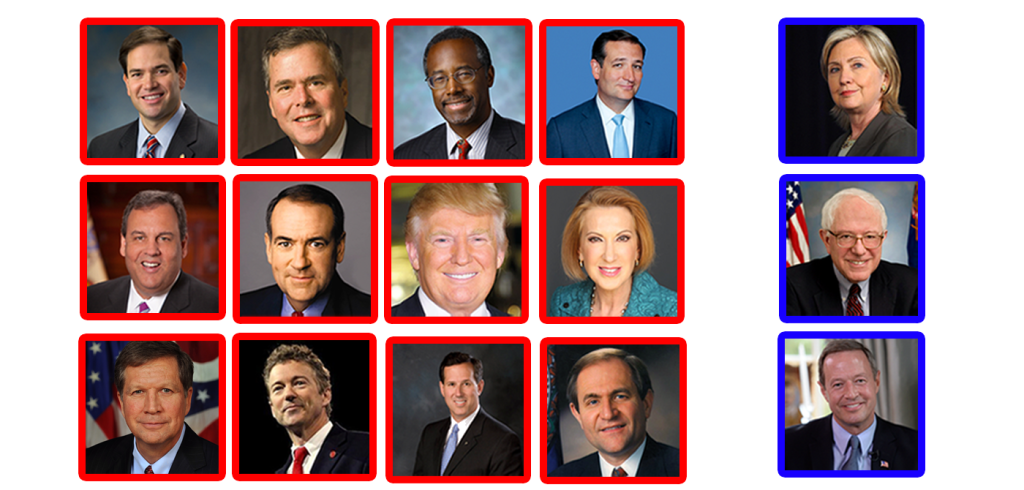
28 days until AL Presidential Primary 280 days until Election Day Convention Dates: Republican July 18-21, 2016, Democratic July 25-28, 2016 Weekly Headlines: Skipping debate, Donald Trump gambles with Iowa Pressure grows on Paul to ditch presidential bid Poll: Sanders and Clinton in tight battle for Iowa Press Clips: Sanders challenges Clinton to 3 new debates (Politico 1/27/16) Hours after Hillary Clinton ratcheted up her pressure on him to accept an invitation to an unsanctioned debate on Feb. 4, Bernie Sanders escalated the debate by calling for three new debates. “From the beginning of this campaign Sen. Sanders has called for more debates. Secretary Clinton has not. Now she is asking to change the rules to schedule a debate next week that is not sanctioned by the DNC. Why is that? The answer is obvious. The dynamics of the race have changed and Sen. Sanders has significant momentum,” said Sanders campaign manager Jeff Weaver in a statement on Wednesday night, while Sanders was speaking to a packed audience here. Trump gets backing of S.C. lieutenant governor (Politico 1/27/16) South Carolina Lt. Gov. Henry McMaster has thrown his support behind Donald Trump and will appear alongside him at a rally Wednesday .In a statement from the Trump campaign, McMaster said he is “delighted” to support the businessman. “He is a man of accomplishment and speaks the truth in words everyone can understand, instills confidence in the people about our country’s bright future, and reflects and believes in the strength and determination necessary for success,” McMaster said. “These qualities — and his quiet compassion for those in need — are essential to ‘making America great again.’” Faith and the 2016 campaign (Pew Research Center 1/27/16) The conventional wisdom in American politics has long been that someone who is not religious cannot be elected president of the United States. Most Americans have consistently said that it is important to them that the president have strong religious beliefs. And a new Pew Research Center survey finds that being an atheist remains one of the biggest liabilities that a presidential candidate can have; fully half of American adults say they would be less likely to vote for a hypothetical presidential candidate who does not believe in God, while just 6% say they would be more likely to vote for a nonbeliever. Jeb Bush super PAC cash plummets (Politico 1/31/16) The super PAC dedicated to former Florida Gov. Jeb Bush’s flagging campaign for the GOP presidential nomination raised $15 million in the second half of the year ― a massive drop- off from the $103 million it raised in the first half ― according to a report filed Sunday night with the Federal Election Commission. The super PAC, Right to Rise, spent $54 million between the beginning of July and the end of last year, leaving it with $59 million in the bank at the beginning of this year, according to the report. Donald Trump reclaims lead in latest Iowa poll (USA Today 1/30/16) Donald Trump has muscled ahead in Iowa, regaining his lead on the brink of the first votes being cast in the 2016 presidential race. Trump stands at 28 percent, while rival Ted Cruz has slid to 23 percent. But there’s still a strong case for Cruz in this race — he’s more popular and respected than Trump, the final Des Moines Register/Bloomberg Politics Iowa Poll shows. “The drill-down shows, if anything, stronger alignment with Cruz than Trump, except for the horse race,” said J. Ann :, the pollster for the Iowa Poll. Fact check: The seventh Republican debate (USA Today 1/29/16) The Republican presidential candidates debated in Iowa Jan. 28 and stretched the facts: Sen. Marco Rubio went too far in claiming that Hillary Clinton “wants to put Barack Obama on the Supreme Court.” An Iowa resident suggested such an appointment to Clinton, and she said she’d take it “under advisement.” Rubio also said that the White House “still refuses to acknowledge” that the shooting of a Philadelphia police officer on Jan. 7 “had anything to do with terror.” DNC expected to sanction Feb. 4 debate in New Hampshire (Politico 1/31/16) The Democratic National Committee will formally sanction the Feb. 4 debate in New Hampshire, hosted by MSNBC, the network announced on Sunday. The debate will be held at University of New Hampshire in Durham at 9 p.m. ET and will be moderated by MSNBC anchors Chuck Todd and Rachel Maddow. All three Democratic presidential candidates, former secretary of state Hillary Clinton, Sen. Bernie Sanders and former Gov. Martin O’Malley are expected to attend. Email issues dog Hillary Clinton on eve of Iowa caucuses (New York Times 1/31/16) This is not what Hillary Clinton wanted to discuss the morning before the Iowa caucuses. But, in her brief appearance on ABC’s “This Week” on Sunday, Mrs. Clinton found herself defending her use of a private email server while serving as secretary of state and reinforcing that she did not knowingly send or receive classified emails. “She lied about the fact that there is nothing classified on my server. Why as long as you can get away with it?” Carly Fiorina says in ABC’s introduction of Mrs. Clinton, who appeared on the show right before her main rival, Senator Bernie Sanders of Vermont. “She put our national security at risk for her convenience,” Chris Christie says.
This week in the U.S. House of Representatives, Senate: Feb. 1 – Feb. 5, 2016
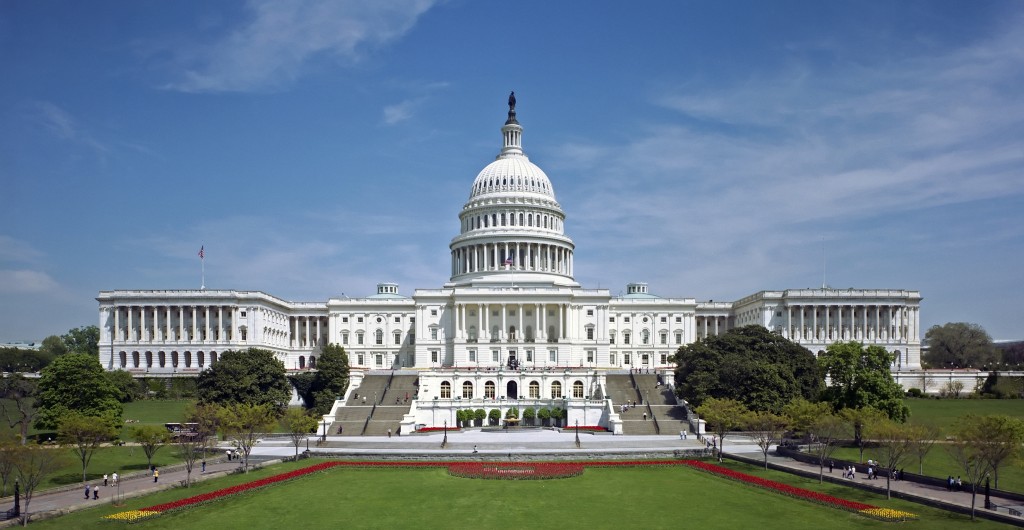
Congressional lawmakers are back in Washington after being disrupted by Winter Storm Jonas last week. Both chambers have full agendas and will be busy making up postponed votes and hearings due to the storm. House Schedule Monday, the U.S. House of Representatives is in session and will consider several bills under Suspension of the Rules. A full list of bills can be found here. Other legislation up for consideration this week: H.R. 3700: the Housing Opportunity Through Modernization Act. The bill modifies various housing laws to try to extend affordable housing options to more low-income families. It allows Public Housing Agencies (PHAs) and the owners of private subsidized housing to verify the income-based eligibility of families through other needs-tested federal programs, modifies requirements regarding the inspection of housing units, eases Federal Housing Authority (FHA) requirements for mortgage insurance for condominiums and establishes a Special Assistant for Veterans’ Affairs within the Housing and Urban Development Department (HUD) to coordinate all HUD programs and activities relating to veterans. Alabama co-sponsor(s): None H.R. 3662: the Iran Terror Finance Transparency Act. The bill restricts the president’s ability to lift sanctions on Iranian and other financial institutions as called for by the Iran nuclear agreement. The House debated the bill on Jan. 13 and initially passed it by a 191-106 vote, but that vote was vacated because nearly 140 members missed the vote. Alabama co-sponsor(s): Rep. Bradley Byrne (AL-01); Rep. Gary Palmer (AL-06) Overriding the president’s veto of H.R. 3762: Restoring Americans’ Healthcare Freedom Reconciliation Act. The measure repeals numerous major provisions of Obamacare, including the individual and employer mandates, tax subsidies for individuals to purchase health insurance from exchanges and the expansion of Medicaid. It also effectively eliminates more than a dozen of the law’s taxes, including the medical device tax, the “Cadillac” tax and the net investment tax, and it blocks federal funding for Planned Parenthood for one year. The Senate passed the measure on a 52-47 vote under the budget reconciliation process, while the House cleared it by a 240-181 vote. The president vetoed the measure Jan. 8. A two-thirds vote of both chambers is needed to override a veto. Alabama co-sponsor(s): N/A H.R. 1675: Encouraging Employee Ownership Act of 2015. The bill requires the Securities and Exchange Commission (SEC) to conduct reviews of its existing regulations to determine whether any are outmoded, ineffective or excessively burdensome, and to modify or repeal rules based on those reviews. It also exempts certain firms that broker mergers and acquisitions from SEC registration requirements, increases the allowable size of privately held companies that may sell securities for certain purposes and exempts smaller companies from requirements that they use a certain technology in filing financial statements to the SEC. Alabama co-sponsor(s): None H.R. 766: the Financial Institution Customer Protection Act. The bill prohibits federal banking regulators from requesting that financial institutions terminate their relationships with specific customers or groups of customers unless the agency has a material reason for requesting that termination, and it restricts the conditions under which the Justice Department may conduct investigations involving financial institutions and seek civil penalties. The bill is a response to the Justice department’s Operation Choke Point that sought to protect consumers from unauthorized withdrawals by third-party payment processors acting as intermediaries for fraudulent merchants, which however some banks began to sever services with entire categories of lawful businesses. Alabama co-sponsor(s): None The House is not in session Friday. Highlights of what is happening in House Committees this week: Budget Views and Estimates: Budget season is heating up, with the House Small Business Committee, the House Select Intelligence Committee, the House Agriculture Committee, the House Financial Services Committee marking up their respective “Views and Estimates on the President’s FY2017 Budget” this week. More Budget: On Wednesday, the House Budget Committee will host a “Members’ Day” to allow members of the House to testify before the committee on the policy priorities they wish to see in the FY2017 budget resolution. And on Thursday, the House Budget Committee will hold a hearing on “The Congressional Budget Office’s Budget and Economic Outlook” featuring CBO Director Keith Hall. More information here. Prescription Drug Market: On Thursday, the House Oversight and Government Reform Committee hearing titled “Developments in the Prescription Drug Market: Oversight.” Of note, Martin Shkreli, former CEO of Turing Pharmaceuticals LLC, may appear as a witness at the hearing. More information here. Flint, MI Drinking Water: On Wednesday, the House Oversight and Government Reform Committee will hold a hearing titled “Examining Federal Administration of the Safe Drinking Water Act in Flint, Michigan.” More information here. Afghanistan: On Tuesday, the House Armed Services Committee will hold a hearing titled “Afghanistan in 2016: The Evolving Security Situation and U.S. Policy, Strategy and Posture.” More information here. Paris Climate Agreement: On Tuesday, the House Science, Space and Technology Committee will hold a hearing titled “Paris Climate Promise: A Bad Deal for America.” More information here. Refugee and Visa Security: On Wednesday, the House Homeland Security Committee will hold a hearing titled “Crisis of Confidence: Preventing Terrorist Infiltration through U.S. Refugee and Visa Programs.” More information here. School Choice: On Wednesday, the House Education and the Workforce Committee will hold a hearing titled “Expanding Educational Opportunity Through School Choice.” More information here. Education Information Security: On Tuesday, the House Oversight and Government Reform Committee will hold a hearing titled “U.S. Department of Education: Investigation of the CIO” featuring Education Secretary John B. King, Jr. More information here. Economy: On Tuesday, the House Ways and Means Committee will hold a hearing titled “Reaching America’s Potential: Delivering Growth and Opportunity for All Americans.” More information here. Military Acquisition Reform: On Wednesday, the House Armed Services Committee will hold a hearing titled “Acquisition Reform: Starting Programs Well.” More information here. Veterans: House Veterans’ Affairs Committee will hold a hearing titled “Lost Opportunities for Veterans: An Examination of VA’s Technology Transfer Program.” More information here. E&W Markup: On Tuesday, the House Education and the Workforce Committee will markup of H.R.4293: the Affordable Retirement Advice Protection Act and H.R.4294: the Strengthening Access to Valuable Education and Retirement
Jim Zeigler to preview State of the State rebuttal Monday evening
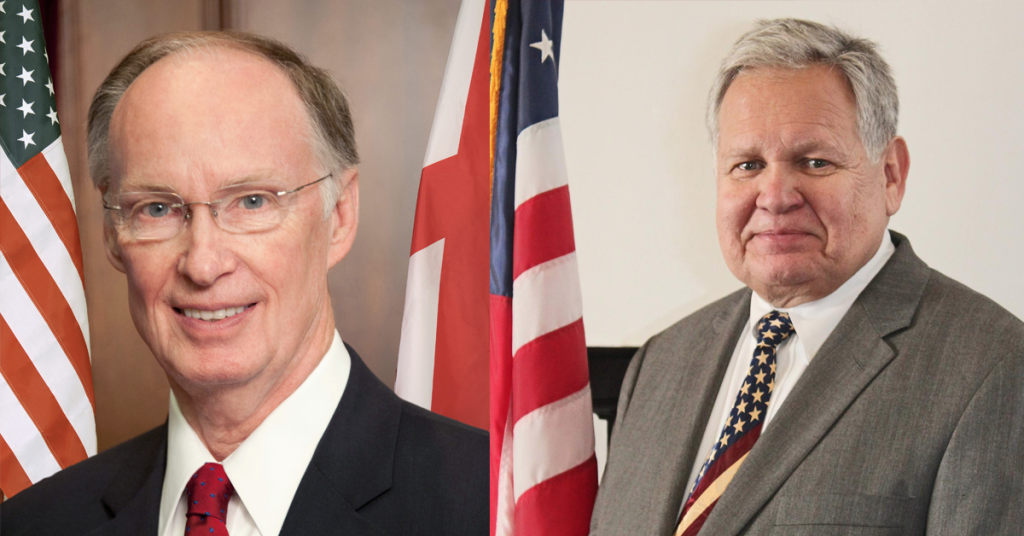
State Auditor Jim Zeigler will give a preview of his unorthodox intraparty response to Gov. Robert Bentley‘s upcoming State of the State address Monday evening. A frequent critic of Bentley, Zeigler recently confirmed he will give an additional response to the governor’s annual address to lawmakers in Montgomery beyond the usual rebuttals from state House and Senate Democrats. Zeigler says he will give his counter-address “on behalf of the taxpaying public,” after he announced two conservative groups led by conservative operative Lou Campomenosi wrote Zeigler with the request. The annual address is scheduled for Tuesday, but Zeigler will give a sneak peek of his speech on his weekly “Weekly Waste Cutter Update” radio segment at 5:29 p.h. CT Monday, during The Rachel Hammers Show, a conservative talk program. The segment will be heard on two stations near Huntsville (WTKI-FM. 92.9 and WTKI-AM 1450) and in Decatur (WEKI-FM 94.7 and WEKI-AM 1490). It can also be picked up nationwide on the web at https://www.wtkiradio.com/ or the TuneIn.com smartphone app. In a social media post promoting the preview, Zeigler provided a list of areas of disagreement between himself and Bentley, whom Zeigler has often criticized as insufficiently conservative. “Now in office for one year, Zeigler disagreed with Bentley’s cancellation of the inaugural prayer service, which Zeigler then hosted anyway,” Zeigler wrote. “He led opposition to the removal of the portraits of Governor[s] George and Lurleen Wallace from the Capitol rotunda. He fought the closing of six state parks, saying the parks generate enough money to be self-sustaining. He criticized the cost of two Special Sessions to pass a general fund budget. He criticized the governor’s spending for personal staff and state aircraft. He called for increased cost control rather than tax increases. He disagreed with the governor’s spending of $1.8 million in BP funds to restore the ‘governor’s mansion at the beach,’” the state auditor continued. “A list of issues on which Zeigler agreed with Bentley would be shorter,” Zeigler said.
Bradley Byrne: Coast Guard has proud history in southwest Alabama

The U.S. Coast Guard has long been a staple right here on Alabama’s Gulf Coast, but do you know how that came to be? Before we get to the Coast Guard’s impact on Southwest Alabama, let’s look briefly at the history of the Coast Guard. On Jan. 28, 1915, President Woodrow Wilson signed into law the “Act to Create the Coast Guard,” and with his signature, the Coast Guard we know today was formally born. The law President Wilson signed combined the Life-Saving Service with the Revenue Cutter Service to form what we consider the modern-day Coast Guard. In reality, the Coast Guard had been around for many years prior. The origins of the present-day Coast Guard can be traced back to Aug. 4, 1790, when President George Washington signed the Tariff Act to empower ten U.S. ships to enforce trade laws and reduce smuggling. The USCG is one of the oldest organizations of the federal government and was the only armed force patrolling the seas until the Navy Department was established in 1798. In 1967, the Coast Guard became a function of the Department of Transportation. The Coast Guard didn’t reach its current home until 2003 when it was placed under the newly created Department of Homeland Security. The Coast Guard has three primary responsibilities: maritime safety, maritime security, and maritime stewardship. These include operations such as search and rescue, law enforcement, ice operations, illegal fishing patrols, drug interdiction, and migrant interdiction. The Coast Guard obviously plays a key role in responding to natural disasters and keeping our waterways open. The Coast Guard is divided into nine separate districts, which are then divided into individual sectors. Southwest Alabama is located in District 8, and we are home to Sector Mobile. Sector Mobile is the Coast Guard command responsible for all maritime operations along 400 miles of the coastline ranging from Pearl River, Mississippi, to Econfina River, Florida. Carrying out these operations are Coast Guard men and women stationed in Mobile aboard the Cutters Saginaw, Barbara Mabrity, Cobia, and Stingray as well as Station Dauphin Island, which is located on the eastern tip of the island. Their efforts keep the citizens of southwest Alabama safe. Locally, the Coast Guard has played an important role with emergency search and rescue efforts during natural disasters. Most recently, the Coast Guard helped respond to the Dauphin Island Regatta tragedy. The Coast Guard is also remembered for their help responding to Hurricane Katrina and the BP oil spill. If you are like me, you probably see the bright orange helicopters flying over our area from time to time. Those Coast Guard helicopters have long been a fixture because Mobile is also home to the Coast Guard Aviation Training Center. I recently had an opportunity to visit the Aviation Training Center to learn more about the impressive work being done to train our Coast Guard aviators. The training includes written coursework, lectures, simulator training time, and then real-time training flights. Every Coast Guard aviator must go through initial training here in Mobile, but they also must return at least once a year for a proficiency course. That’s why so many of the Coast Guard aviators I have visited with over the years have very fond memories of southwest Alabama. We are so fortunate to have such a strong Coast Guard presence here in our own backyard. I will always stand up for the members of the Coast Guard and do everything I can to support the vital role they play in our national security and maritime safety operations. • • • Bradley Byrne is a member of the U.S. Congress representing Alabama’s 1st Congressional District.
Felony drug offenders now eligible for SNAP, TANF benefits in Alabama

On Saturday Alabama joined most U.S. states by allowing people with a past felony drug conviction to receive Supplemental Nutrition Assistance Program (SNAP) benefits, as well as Temporary Assistance for Needy Families (TANF) assistance, according to a news release by Alabama Arise. The lifetime ban on SNAP, formerly known as the Food Stamp Program, and TANF benefits for drug offenders grew out of a 1996 federal welfare reform law enacted by former President Bill Clinton, though the law does allow states to request a waiver. Though most other states requested a waiver before, Alabama included reinstating the benefits in a 2015 prison reform law sponsored by Sen. Cam Ward (R-Alabaster) with a floor amendment offered by Sen. Linda Coleman (D-Birmingham). Restrictions still apply to drug offenders seeking benefits, including the completion of their sentence and probation requirements. Further, persons with a drug offense in the past five years may be required to pass a drug test to receive TANF benefits. People previously denied Snap or TANF benefits because of a drug offense can apply at a local Department of Human Resources office after Monday. Further, households already receiving benefits but have a household member not included because of a drug conviction can report the “newly eligible person” to the household’s caseworker. “The end of Alabama’s SNAP and TANF bans is good news for state budget and for families,” the Arise news release said. “The policy change will help cut corrections costs in the cash-strapped General Fund budget by making it easier for released prisoners to reintegrate into the community, which will help reduce recidivism. Importantly, restoring SNAP and TANF benefits also will help prevent hunger and homelessness among some of Alabama’s most vulnerable families.” Officials with Alabama Arise estimate that 30,000 to 80,000 Alabamians would become eligible for SNAP benefits under the change, with TNF benefits being harder to monitor because they are more difficult to secure. Both programs are funded by federal dollars, so the influx of new beneficiaries will add no new costs to the state.

